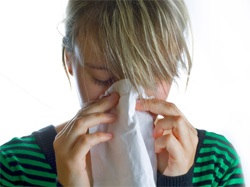Impact of acupuncture for allergic rhinitis on the activity of the hypothalamus-pituitary-adrenal axis: study protocol for a randomized controlled trial.
Kristen Sparrow • January 06, 2020

 I’m including this here even though it’s only an announcement of a study that will be undertaken, because this was the initial revelation I had so many years ago about the possible link between acupuncture and stress levels. I was trying to make sense of how acupuncture helped allergy and panic attacks since the prevailing medical model at the time was “gating”. I happened to hear a lecture by Robert Sapolsky and that launched the research trajectory I’ve been on since. For better or worse!! Related topics are IGA and HRV with needling at LI11 and LI4. Also this study from Australia looking at allergic rhinitis and allergy.
I’m including this here even though it’s only an announcement of a study that will be undertaken, because this was the initial revelation I had so many years ago about the possible link between acupuncture and stress levels. I was trying to make sense of how acupuncture helped allergy and panic attacks since the prevailing medical model at the time was “gating”. I happened to hear a lecture by Robert Sapolsky and that launched the research trajectory I’ve been on since. For better or worse!! Related topics are IGA and HRV with needling at LI11 and LI4. Also this study from Australia looking at allergic rhinitis and allergy.
Impact of acupuncture for allergic rhinitis on the activity of the hypothalamus-pituitary-adrenal axis: study protocol for a randomized controlled trial.
Author information
- 1
- Department of Acupuncture and Moxibustion, Dongzhimen Hospital Affiliated to Beijing University of Chinese Medicine, Beijing, China.
- 2
- Beijing Chaoyang Hospital, Beijing, China.
- 3
- Institute of Acupuncture and Moxibustion, China Academy of Chinese Medical Sciences, Beijing, China.
- 4
- European Foundation of TCM, Alicante, Spain.
- 5
- Acupuncture Department, Medimar International Hospital, Alicante, Spain.
- 6
- Department of Acupuncture and Moxibustion, Dongzhimen Hospital Affiliated to Beijing University of Chinese Medicine, Beijing, China. wangjunee@yeah.net.
- 7
- Department of Acupuncture and Moxibustion, Dongzhimen Hospital Affiliated to Beijing University of Chinese Medicine, Beijing, China. zjp7883@sina.com.
Abstract
BACKGROUND:
Patients with moderate and severe persistent allergic rhinitis (AR) have long-term physical and mental stress, leading to dysfunction of the hypothalamus-pituitary-adrenal (HPA) axis, which results in recurrence of AR. Previous research has proved acupuncture can regulate the function of the neuron-endocrine-immune system and contribute to improving the quality of life of patients with AR. This research aims to investigate the mechanism of acupuncture on the HPA axis in patients with moderate or severe persistent AR.
METHODS/DESIGN:
This randomized controlled trial aims to study the impact of acupuncture on the HPA axis of patients with moderate and severe AR. This research also aims to compare the curative effects of different treatments in three groups of patients: those receiving western medicine, western medicine and conventional acupuncture, or western medicine and mind-regulating acupuncture. We will study the therapeutic effect of acupuncture and the correlation between the changes of therapeutic indexes and experimental indexes after the treatments. Therapeutic indexes include the Visual Analog Scale (VAS) of nasal symptoms and the Rhinoconjunctivitis Quality of Life Questionnaire (RQLQ) for AR patients; experimental indexes include corticotropin releasing hormone (CRH), adreno-corticotropic hormone (ACTH), cortisol (CORT), interleukin 4 (IL-4), and interferon-γ (IFN-γ).
DISCUSSION:
The results of this trial will provide evidence for the influence of chronic, long-term, repeated stimulation in patients with moderate and severe persistent AR and the impact of acupuncture on the HPA axis of these patients.

